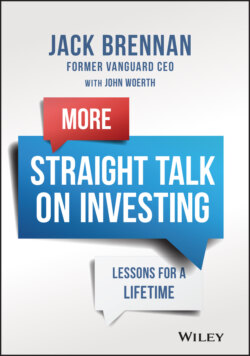Читать книгу More Straight Talk on Investing - John J. Brennan - Страница 25
Be Observant: Keep Learning About Investing
ОглавлениеAs common sense might dictate, successful investors need to keep absorbing new information. In any endeavor, whether it's parenting, a profession, or athletics, you must keep learning to stay up to speed.
Your efforts don't need to be time-consuming. Devote a little bit of regular attention (or a regular bit of a little attention) to the markets and to your own investments. Read, on occasion, reputable websites or publications that cover business and investing news. I say periodic attention because it's misleading—and downright hazardous to your wealth—to slavishly follow the movements of the markets or the fortunes of particular segments or companies on a daily, weekly, monthly, or even annual basis.
What you want to accomplish is threefold:
1 To deepen your understanding of what happens to your investments.
2 To protect yourself in case of developments that threaten your investments.
3 To keep abreast of new opportunities.
New investment opportunities will surface from time to time. You can distinguish the significant ones from the ephemeral ones by taking a close look at the trade-offs. Should you be willing—as some investors were in the 1990s—to give up the diversification of a broadly based mutual fund in order to seek a higher return by sinking all of your money into one hot-performing technology stock? No way, and I'll explain why in Chapter 6. Should you be willing to give up the safety of a passbook savings account at the bank for a higher-yielding money market fund that invests in high-quality, short-term commercial debt, as millions of investors have done in the last few decades? Sure.
Missing valuable new investment opportunities can hurt you—sometimes a little, sometimes a lot. The rise of money market funds in the late 1970s is a perfect case in point. In retrospect, money market funds revolutionized the financial industry because they offered market interest rates on very liquid, high-quality securities. Investors who continued to keep their short-term savings in non-interest-bearing checking accounts after money market funds became available missed an important opportunity to create more wealth for themselves.
With any new, innovative financial product, however, there's no need to rush in until it is determined that the solution is truly enduring. As my good friend Burt Malkiel once said: “Never buy anything from someone who is out of breath.” As I mentioned in the Acknowledgments, if you wish to become a student of investing, I suggest you read Malkiel's A Random Walk Down Wall Street. This classic popularized the theory that stock prices take a random and unpredictable path, and thus predicting future, short-term price movements is futile. In his book, Malkiel says “a blindfolded monkey throwing darts at a newspaper's financial pages could select a portfolio that would do just as well as one carefully selected by experts.” (I had the pleasure of serving on Vanguard's Board of Directors with Burt for nearly 18 years. He is a great investment mind and was a valued Trustee during his 28-year tenure.)
Malkiel's random walk theory is an important underpinning of another important innovation: Index mutual funds, which were largely an institutional investment strategy until the mid-to-late 1990s. Indexing is an investment strategy in which a fund seeks to match the performance of a market index (e.g., the S&P 500 Index) by holding all the securities in the index or a carefully chosen sample of them. That may sound less than exciting until you realize that index funds have a tremendous cost advantage that can mean greater returns for their investors. The trade-off is that with an index fund, you will never “beat the market.” It took decades for the merits of index funds to gain traction, but by now millions of investors have realized that the certainty of keeping up with the market is a very worthwhile trade-off for the possibility of beating it. Investors who have forgone investing in index funds have done so to their detriment. I'll discuss the index funds and actively managed funds later in this book.
So, there you have it. I've introduced you to the four priorities of confident investors. In the next chapter, I'll cover another important factor: trust.
